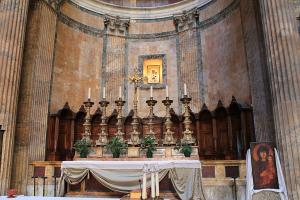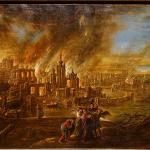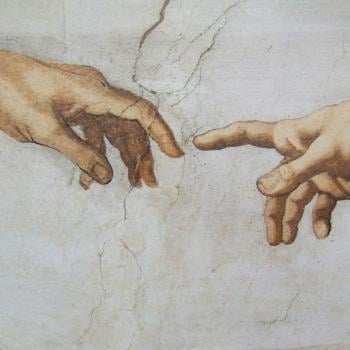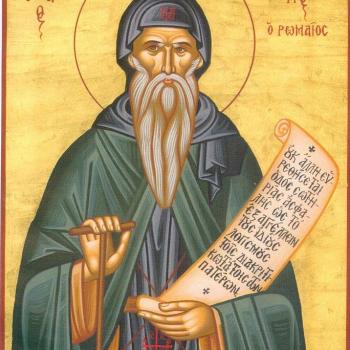
The Feast of All Saints reminds us that Christ did not come to save us as individuals separate from each other, but as a community, as a body which is made one in and through him. All those who are saved, through their union with him, through their placement in his body, will become sanctified. Their union with him, in and through his human nature, will allow them to engage the divine nature, for he is God and man, and his humanity is, in his person, one with his divinity. That is, in and through him, in and through their union with him, all the saved will be drawn into the divine life for themselves. They will experience it as it is, the community of love; the three persons of the divine Trinity have opened up a space for them to share in and with that love, to reflect that love by loving each other.
Everyone is called to become a god by grace, that is, to be deified, and through that deification, to find their eternal destiny (cf. Jn. 10:34). What happens in time and space is important because it forms the foundation for eternity. Nonetheless, thanks to eschatological graces, eternal life is going to be more than what is found in temporal existence. What we make for ourselves in time will be taken up and supplemented with grace, so that we can become much greater in eternity, allowing us to find eternal life no longer one of pain and sorrow but of joy. What is established in time will always remain, it is not something which will be abandoned or annihilated, and so, we will undergo change similar to the way we did during different stages of our earthly life (embryo, infant, toddler, child, teen, adult, old age, death), which means, though we will change we will also be the same.
While on the Feast of All Saints we are to commemorate all those who came before us who, through grace, were saved, and so all those who have their place in the eschaton, receiving deifying grace, we should also remember the day is also a day meant not just to honor them but to encourage us. It is a day for us just as much as it is for them. For it encourages us to join in with the saints, all those who can be said to have been deified and become, as it were, a god by grace.
Due to the relationship between eternity and time so that eternity penetrates all of time, and through all time, all space, what is found in and experienced in the eschaton can and does reach down to us in temporal existence. This is because eternity is not bound by temporal existence, rather, temporal existence is bound by eternity. When we think about the eschaton in this fashion, we can realize that the celebration of All Saints should not just be about the people who came before us in time, but all the saints who shall ever be, a collection which we hope will include ourselves. And so, by embracing the spirit of the day, we might be honoring ourselves just as much as all the other saints, which of course, is what the saints want, for they are the cloud of witnesses encouraging us to join in with them, so we can share with them the experience of the kingdom of God:
Therefore, since we are surrounded by so great a cloud of witnesses, let us also lay aside every weight, and sin which clings so closely, and let us run with perseverance the race that is set before us, looking to Jesus the pioneer and perfecter of our faith, who for the joy that was set before him endured the cross, despising the shame, and is seated at the right hand of the throne of God (Heb. 12:1-2 RSV).
Jesus’ ascension is described as him going to the “right hand of the throne of God.” Though we tend to conceive the ascension in an overly physical fashion, leading us to think he went to a particular place within time and space, this is not what the ascension is about. God is not in a particular place. God is not bound by temporal existence, and with it, spatial qualities. God is eternal and omnipresent. That is, God is everywhere present and fills all things with the presence and grace of the divine nature. In his ascension, the humanity of Jesus is brought to a new mode of existence, where it is spiritualized, transcending time and space so that it can be said to be completely present with all creation as it is joined with and connected with the divine presence. The transformation which the ascension engages must not, however, be misunderstood as if it means Jesus’ humanity in some way merged with the divine nature, so that two come together to create a new, third nature, or that the human nature is dissolved in the ocean of the divine nature so that it no longer exists. Jesus’s humanity remains, and with it, all that is found in and with it, including his body and soul, continue to be a part of him. Through them, he continues to have a connection with the created (material) world, for though they exist in a new mode of being, they remain connected to the rest of created nature, and that connection allows him to draw all of creation to be with him, to have them transformed alongside him, so that in the eschaton, they can become spiritualized like him. And through that spiritualization, through their union with Jesus in our common bond, they will find themselves brought to the divine nature and united with it. This is what theosis, deification, is about – it is not a transformation of humanity into the divine nature, but rather, it is about the realization of its unity with God and how that unity will change it and make it greater through grace. Its mode of existence will be changed. It will be glorified by grace in the way Jesus’ humanity is shown to be glorified. Its existence will no longer be mortal, no longer bound by the laws of time and space. Thus, we will become gods, once again, not by nature but by grace, sharing in the eternity of God for ourselves. Those who welcome grace will find their eternal existence to be one of perpetual joy, while those who do not, those who struggle against it, will find that while grace comes to them, it will seek to transform them, to take away all defilement which gets in the way of their glorification, but because they struggle against it, they will continue to make defilements for it to overcome, which is why they can find themselves coming to a state of perpetual suffering, as they will experience the work of grace as a consuming fire. To be sure, as we all have imperfections which grace will need to purify, all of us all experience the purifying fire of grace, but the key is for us to embrace it, so that we become one with it instead of resisting it, for if we resist it perpetually, our eternity might end up being one of perpetual suffering.
Finally, the Feast All Saints remembers the time when the Pantheon was taken over by Christians and transformed into a church, the church of All Saints. That is, it remembers the way grace works to take anything given to it, to find the good in it, and perfect it. The temple which commemorated all the gods became the church presenting to the world all the saints. The former state of the church in its existence as a temple for the gods foreshadowed what it was to become. For, there is a truth which can be found within its existence as the Pantheon. All the saints can be said to be gods because they are gods by grace. They are not, however, to be seen as gods by nature, nor to be seen as selfishly seeking after the fulfillment of their own lusts and malicious whims. They are gods by grace, thanks, that is, to their participation with the divine nature. Each one of them, in their own way, represents God. Each of them contains within them the image and likeness of God. The saints are not to be treated as gods by nature, given the honor and adoration due to God alone, but they can be and should be honored for the good which they have done, and even more, for the good which is in them thanks to grace, that is, thanks to God’s work in and through them. While the pre-Christian understanding of the gods was wrong, and the kind of worship they were given was wrong, there nonetheless is a sense that behind it all, there was a brief shadow of the truth. For it to be found, however, the Pantheon had to be purified. All the excesses and abuses which was done in it had to be stopped so that the temple could be transformed and made into a church, but the truth behind the idea of honoring the whole body of the gods as one finds itself fulfilled in and with the honoring of the saints. And though their nature is not divine, their engraced state is a deified state, and honoring them in that state brings even more honor and glory to the God, for the more they are honored, the more the God who glorified them is honored and recognized as well. And so, in the way the Pantheon was transformed, we see in the process the way grace works – it takes whatever is good and true it finds contained in some kind of defilement, purifies it, and then finds a way to perfect it. And so the Feast of All Saints, in this way, is a feast of grace, presenting us how grace works, and by doing so, gives us hope that we can and will have a place among the saints of God.
Stay in touch! Like A Little Bit of Nothing on Facebook.
If you liked what you read, please consider sharing it with your friends and family!
N.B.: While I read comments to moderate them, I rarely respond to them. If I don’t respond to your comment directly, don’t assume I am unthankful for it. I appreciate it. But I want readers to feel free to ask questions, and hopefully, dialogue with each other. I have shared what I wanted to say, though some responses will get a brief reply by me, or, if I find it interesting and something I can engage fully, as the foundation for another post. I have had many posts inspired or improved upon thanks to my readers.












